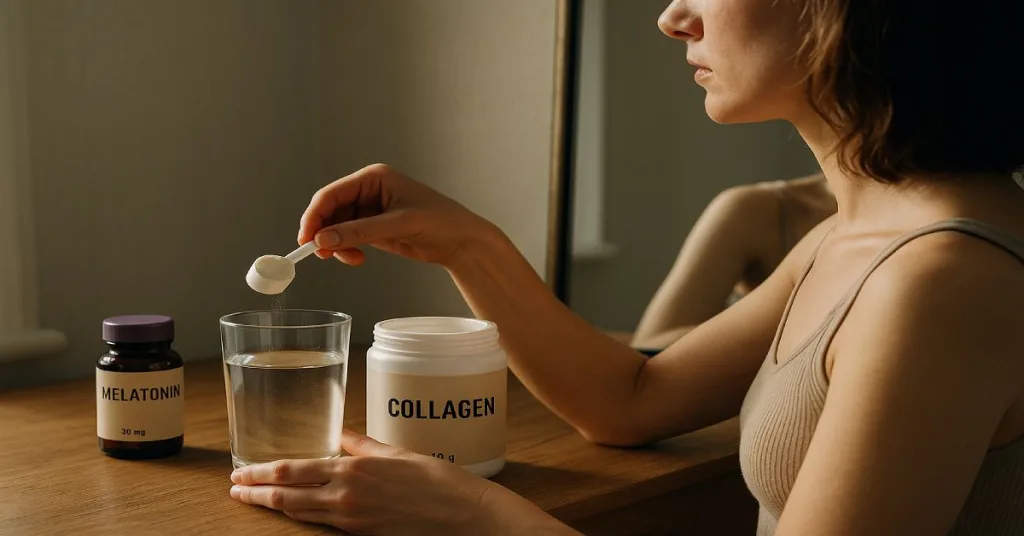Every month, a new “miracle stack” hits the supplement market — promising to melt fat from a specific body part. One of the newest trends: neck fat supplements.
They’re marketed as sleek combinations of collagen, melatonin, and minerals, all claiming to “tighten your jawline,” “burn stubborn fat,” and “restore your youthful profile while you sleep.”
It’s a convincing pitch. After all, who doesn’t want a slimmer neck without surgery or crash diets? But when you peel back the marketing, the truth is simpler — and less glamorous. There’s no capsule that melts fat in one area. What some of these ingredients can do is help your skin, metabolism, and sleep, all of which play indirect roles in how your body looks and feels.
Let’s dig into what’s real, what’s exaggerated, and what’s flat-out wrong.
This article may contain affiliate links. If you click through and buy, we may earn a small commission at no extra cost to you.
The Problem with “Targeted Fat Loss”
The first red flag in any supplement that promises “neck-specific” results is the concept of spot reduction.
Human physiology doesn’t work that way. You can’t tell your body to pull fat from one pocket at a time. Fat loss happens systemically, driven by overall energy balance, hormones, genetics, and muscle distribution.
That’s why most research on “targeted fat burn” fails to replicate. Doing hundreds of crunches won’t burn belly fat, and no pill will selectively shrink the double chin.
When supplement companies market “neck fat” products, what they’re really doing is rebranding general wellness ingredients—collagen for skin, melatonin for sleep, minerals for thyroid and metabolism—and framing them as something more dramatic.
That doesn’t mean those ingredients are useless. But it does mean you should understand what they really do before you spend money on another shiny bottle.
1. Collagen: The Skin-Support Ingredient That Gets Miscast as a Fat Burner
Collagen peptides are one of the most popular supplements of the last decade. They’re praised for improving skin elasticity, joint comfort, and hair strength—and with good reason. There’s solid data to back up some of those claims.
What It Actually Does
- Supports skin structure: Collagen makes up roughly 75% of your skin’s dry weight. Studies show that daily collagen peptides (around 2.5–10 g) can improve elasticity and reduce fine lines within 8–12 weeks.
- Aids in protein intake: Each scoop adds roughly 9–10 g of protein, which can help you hit your daily goal—especially important during calorie restriction.
- May improve satiety: Some people report feeling fuller after collagen due to its gelatin-like properties.
What It Doesn’t Do
Collagen doesn’t increase fat oxidation, raise metabolism, or cause localized fat loss. It also doesn’t “tighten” skin the way a facelift does; it simply improves internal structure and hydration.
That’s valuable—but not the same thing as “melting fat.” The confusion comes from collagen’s visible effect on skin firmness, which can make the neck look a little tighter even without fat loss.
Verdict: Collagen is useful for skin health and fullness, not fat reduction. It can complement weight-loss efforts, but it’s not a substitute for them.
2. Melatonin: Sleep Hormone, Not a Midnight Fat Burner
If collagen is the “beauty” piece of the stack, melatonin is the “night-time fat-burner” claim.
Why People Believe It
Poor sleep is directly linked to weight gain. When you sleep less than six hours a night, ghrelin (your hunger hormone) rises, leptin (your fullness hormone) drops, and insulin sensitivity takes a hit. Over time, that combination encourages fat storage, particularly around the neck and midsection.
Because melatonin regulates your sleep-wake cycle, supplement companies spin that into “melatonin helps you burn fat while you sleep.”
What Research Actually Shows
- Improves sleep quality: Doses between 0.5 mg and 3 mg reliably reduce sleep latency and increase total sleep time.
- Balances circadian rhythm: Better circadian health supports metabolic function.
- Slight metabolic influence: A few small studies found melatonin supplementation can modestly improve body composition when combined with a calorie deficit, possibly due to better sleep and hormonal balance—not direct fat burning.
What It Doesn’t Do
Melatonin doesn’t raise resting metabolic rate, mobilize fat from specific areas, or trigger thermogenesis. It helps you sleep, and sleep helps everything else function properly.
Verdict: Melatonin is a great supporting actor—important for recovery and hormonal balance—but not the star of fat loss.

3. Mineral Stacks: The “Metabolic” Mix That’s Often Oversold
This part of the trend usually combines iodine, selenium, zinc, magnesium, chromium, and sometimes calcium. The claim: they “rev up thyroid function” and “reignite metabolism.”
The Kernel of Truth
Your thyroid gland does need certain minerals to produce and convert hormones that regulate energy use.
- Iodine forms the backbone of thyroid hormones T3 and T4.
- Selenium converts the inactive T4 into the active T3.
- Zinc and magnesium play smaller supporting roles in hormone signaling and insulin sensitivity.
If you’re deficient, your metabolism slows down. Correcting that deficiency can increase energy and normalize body weight.
The Problem
Most people aren’t deficient—especially in developed countries where iodized salt and fortified foods exist. Taking extra iodine or selenium when you don’t need them can actually harm thyroid function.
Meanwhile, chromium picolinate and calcium have mixed evidence at best for influencing weight, and none for specific fat sites like the neck.
| Mineral | Primary Role | Helps With Fat Loss? | Risks if Overused |
|---|---|---|---|
| Iodine | Builds thyroid hormones | Only if deficient | Can cause goiter or thyroid dysfunction |
| Selenium | Converts T4 to T3 | Only if deficient | Toxicity, nausea, fatigue |
| Zinc | Hormone & enzyme support | Indirect | Nausea, copper imbalance |
| Magnesium | Energy & muscle function | Indirect (sleep, stress) | Laxative effect at high doses |
| Chromium | Insulin sensitivity | Weak, inconsistent | GI distress, minimal effect |
| Calcium | Bone health | Neutral | Kidney stones (rare) |
Verdict: Mineral support matters—but supplementation should be based on bloodwork, not marketing. “More” is not “better.”
Why People Think the Stack Works
When people take these stacks and see improvement, it’s rarely because they’re “melting” neck fat. It’s because they’re:
- Sleeping better (melatonin)
- Eating better or training harder (collagen helps recovery)
- Correcting mild deficiencies (minerals)
- Paying more attention to lifestyle factors overall
The end result? Better skin tone, posture, water balance, and body composition — all of which make the neck look leaner.
That’s a win. But it’s not magic.
What Actually Works for Reducing Neck Fat
If your goal is to reduce fullness under the chin or jawline, here’s what evidence supports:
- Overall calorie deficit. The basics still work—burn more than you consume.
- Higher protein intake. Helps preserve lean muscle and improve satiety.
- Strength training. Improves posture and muscle definition in shoulders and neck.
- Consistent sleep. Reduces cortisol and improves recovery.
- Hydration & sodium control. Prevents bloating that accentuates neck puffiness.
- Patience. Most people notice neck changes last because fat stores are genetically stubborn.
For cosmetic refinement, medical procedures like Kybella injections or cryolipolysis (fat freezing) are the only ways to physically destroy fat cells in that area.
The Smart Way to Use These Supplements
You can absolutely use parts of the stack if they fit your needs.
Here’s how to make them work with your plan, not instead of it.
Collagen
- Use 10–20 g daily if your diet lacks high-protein meals.
- Look for hydrolyzed collagen peptides from bovine or marine sources, third-party tested.
- Combine with vitamin C for better collagen synthesis.
- Think “skin and recovery,” not “fat melting.”
Melatonin
- Try 0.5 mg to 3 mg 30–60 minutes before bed.
- Start low to avoid grogginess.
- Ideal if you work nights or have delayed sleep cycles.
- Pair with good sleep hygiene: no blue light before bed, consistent schedule.
Mineral Support
- Only supplement what’s deficient.
- Ask your doctor for labs: TSH, free T4, free T3, selenium, zinc, magnesium.
- A balanced multimineral may help if your diet is limited, but avoid “thyroid boosters” with megadoses of iodine or selenium.

The Bigger Picture: Why “Shortcut” Culture Exists
Fat loss sells. Specific fat loss sells even better.
Neck fat is an easy target—visible, emotional, and tied to self-image. Marketers know this, so they repackage common wellness ingredients with new promises.
The result is the same stack of sleep aid + protein + mineral blend relabeled as “neck-sculpting formula” with a premium price.
As a consumer—or a writer—you have to spot the recycled formulas and read the fine print. Most of these products list “proprietary blends” without revealing dosages, which is a red flag.
If the total collagen per serving is under 5 g, or the melatonin dose exceeds 5 mg, or iodine tops 150 µg, the formula is poorly balanced or unsafe for daily use.
In short: good ingredients, bad marketing.
Key Takeaways
- No supplement melts neck fat.
- Collagen improves appearance of skin, not fat breakdown.
- Melatonin supports sleep and indirectly aids metabolism.
- Minerals help only if you’re deficient.
- The illusion of results often comes from better sleep, hydration, and consistency.
For real fat reduction, stick to calorie control, exercise, and long-term habits. Use supplements as support—never as your main strategy.
The Bottom Line
“Neck fat supplements” sound innovative, but they’re just old formulas wearing new labels. The real science behind these ingredients is solid—but not for spot reduction.
Collagen helps your skin look healthier. Melatonin helps your body rest and recover. Minerals help your metabolism run smoothly when you’re lacking them. Put those together and you may look better overall—but not because fat cells under your chin are “melting.”
Think of these supplements as tune-ups, not transformations. They can play a meaningful role when you’re already sleeping well, eating smart, and staying active. That’s the combination that actually changes the mirror.
This content is for informational purposes only and is not intended as medical advice. Always consult with your healthcare provider before starting any new supplement or treatment.
You may also like: The 5 Best Supplements for Weight Loss (That Actually Work)
Research & Sources
- A Review of the Effects of Collagen Treatment in Clinical Studies — National Center for Biotechnology Information (NCBI)
- Melatonin: Benefits, Uses, Side Effects, and Dosage — healthline
- Selenium Supplementation, Body Mass Composition, and Leptin Levels in Patients with Obesity on a Balanced Mildly Hypocaloric Diet: A Pilot Study — NCBI
- Trace Elements and the Thyroid — Frontiers in Endocrinology
- Chromium Picolinate Supplementation for Overweight or Obese Adults — PubMed Central
- Impact of Collagen Peptide Supplementation in Combination with Long-Term Physical Training on Strength, Musculotendinous Remodeling, Functional Recovery, and Body Composition in Healthy Adults: A Systematic Review with Meta-analysis — Springer Nature
- The Role of Nutrition on Thyroid Function — MDPI